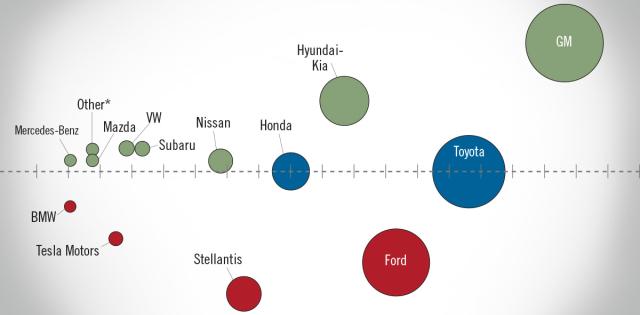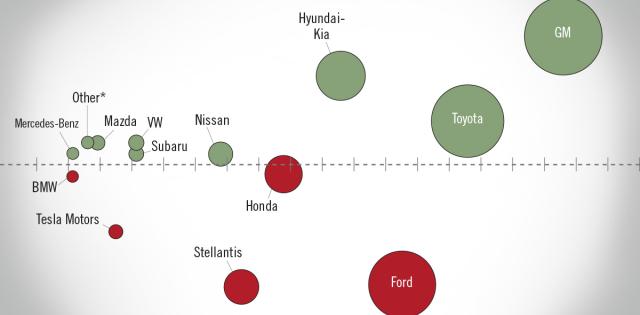The article below is sourced from Reuters Wire Service. The views and opinions expressed in this story are those of the Reuters Wire Service and do not necessarily reflect the official policy or position of NADA.
The restoration of Ford Motor Co's investment-grade credit rating this week after almost four years as a "junk"-rated company sent some positive ripple effects through the U.S. corporate bond markets, analysts said.
S&P Global Ratings on Monday upgraded the automaker's credit rating to BBB-, returning the company to investment-grade for the first time since downgrading it to high-yield in March 2020.
Ford still has a Ba1, or junk, rating from Moody's or one notch below investment grade.
Analysts said the S&P rating boost for Ford's billions of dollars of bond debt has been a positive for investment-grade bond demand, as index-tracking funds adjust their holdings.
Demand for junk bond paper also grew as investors looked to replace Ford bonds with other likely winners.
"Investors benchmarked to the high yield index will likely rotate out of Ford paper and into other high yield names, causing a positive demand dynamic for other credits in this universe," said Blair Shwedo, head of public sales and trading at U.S. Bank.
BoFA Global strategist Yuri Seliger said in a report on Wednesday that rising stars such as Ford, or those that move from junk to investment-grade, are expected to total around $45 billion over the next 12 months, based on the amount of bonds that was one upgrade away.
"(With) $41 billion currently in the high-yield index, [Ford's] upgrade is bound to create a massive positive technical tailwind in its wake," Bank of America analysts said on Friday.
Data from BondCliQ Media Services notes that $67 billion in outstanding Ford bonds would leave the junk bond market after the upgrade.
Investment-grade funds have seen net inflows of $1.7 billion over the past week, after outflows of $5.7 billion over the previous two weeks, according to JPMorgan research using data from EPFR.
Of the inflow, $1 billion in volume went into the long end of corporate-only funds, the most since mid-June, JPMorgan said.
S&P's upgrade of Ford comes a week after the resolution of the United Autoworkers' strike, with the company agreeing to a significant boost in compensation for its employees.
Just days after regaining its investment-grade rating, Ford Motor Credit raised $2.75 billion through the issue of 5- and 10-year bonds on Thursday.
The deal, which came five years after Ford last tapped the U.S. public debt market with an investment-grade rating, attracted enough demand to cover the amount being sold 5.49 times, according to IGM.
The average IG bond spread tightened 4 basis points on Thursday, according to ICE BAML data, after nudging 1bp wider to 133bps on Wednesday when the U.S. Federal Reserve announced its decision to leave interest rates on hold again.
That was the largest narrowing in a single day for the investment-grade index since the aftermath of regional banking stress in March, BMO Capital Markets noted in a report.
Junk bond spreads have tightened 35 basis points (bps) this week, according to ICE BofA data.
"It's sizable, so if anything, it's going to weigh down on average on indexes, but as more of a technicality," said Natalie Trevithick, head of investment grade credit strategy at asset manager Payden & Rygel in Los Angeles.
For more stories like this, bookmark www.NADAheadlines.org as a favorite in the browser of your choice and subscribe to our newsletter here:











